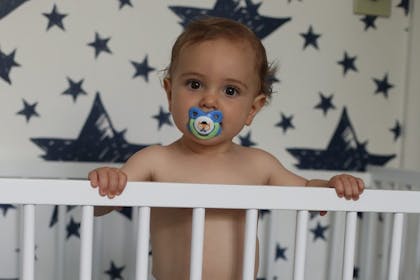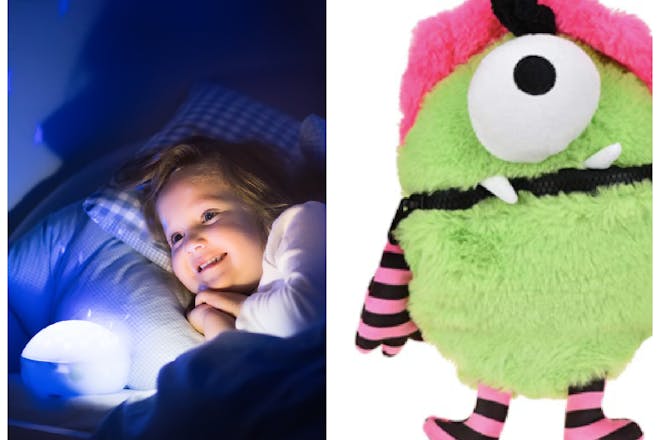As well as affecting daytime routines, separation anxiety can disrupt (everyone's) sleep at night too. Here's how to deal with separation anxiety in the wee small hours.
While separation anxiety can be a trying experience for both you and your little one, the NHS says that it is a normal developmental stage that almost all babies go through. After all, you've spent weeks and weeks bonding with them, day and night, so it's only natural that they start to notice and dislike when you're not there.
It can be a bit of a tough time when you've finally got them to start sleeping through and then suddenly, in the middle of the night, they get too anxious to sleep. It might be normal, but that doesn't make it much fun!
So, what do you need to know about separation anxiety at night, and what can you do to help your little one know that you'll come back?
FREE NEWBORN NAPPIES
What age does separation anxiety start?
While it can begin as early as 6 months , Healthy Children says that separation anxiety usually peaks when babies are around 10 months old . The clingy stage can even last right up until they start school.
Fear not! Understanding what separation anxiety is and how you can guide your baby through it can help all of you to cope.
How can separation anxiety affect my baby's sleep?
It's not only in the day that your baby can panic when you are out of sight.
Often, just as you've got your baby's sleeping sorted , along comes separation anxiety and disrupts it again, causing your little one to wake up throughout the night. And then, they wake you up, which can have a knock-on effect on your happiness and ability to cope during the day.
Even something as simple as bedtime can be a cause of anxiety for your baby. When you leave their room, they have no way of knowing if you'll come back.
Your baby might also start waking up early. Again, the feeling of anxiety can cause your baby to wake up early and then not be able to go back to sleep. Knowing about separation anxiety can help you to understand why your child might be experiencing stress at bedtime .
How to deal with your baby's separation anxiety
It is kinder to try to manage your baby's distress in a way which does not cause them even more upset - after all, the fear that your child is feeling is very real to them.
Better Health does not recommend letting your baby cry it out, as you want them to trust that you will come back whenever you do leave.
Here are some strategies for helping your baby cope with separation anxiety at night:
- Leave the room but continue to talk or sing to your little one. Leave them for a few seconds initially, then gradually extend the time so they get used to you leaving and then coming back.
- Play peek-a-boo during the day. This will help your little one learn that you can disappear but will return. You could start by covering your face with a book. When you say 'boo' make sure you're smiling and laughing.
- Play hide and seek in the room you're in. When you're hiding, let your little one see you initially, then hide so they can’t, but continue to talk to them. Again greet them with smiles and laughter.
- Let her have something that smells of you . Spray your perfume or aftershave on a toy to leave with them, or give them a top or t-shirt you've worn that day. Your scent may comfort your child when you're not there.
- Practice ‘bye, bye’. Say ‘bye, bye’ and wave, then go out of sight and quickly come back. Again, smile and wave while you're leaving and come back all smiles.
- Use lift-the-flap books. These are a great way to show your baby that things can be hidden but still re-appear.
- Have extra cuddles before bed. Help your baby wind down for bed while cuddling them, singing to them or talking to them . This will help with separation anxiety, and also settle them for bedtime .
Sleep training techniques to help with separation anxiety
If you think your baby or child is suffering from separation anxiety then it can be kinder to use a gradual method of sleep training rather than a technique like controlled crying . Some studies have even shown that using controlled crying can cause emotional difficulties later in your child's life.
Read about the 'disappearing chair' or gradual retreat method, the pick up, put down and no cry approach to see if any of these might suit your baby and you.
Just remember that nighttime waking is normal, and not all babies learn to sleep the night through at the same age. It will pass in time, though you might be able to help it along with some of the sleep training suggestions above.
Need advice?
Our health visitors and nursery nurses are online Monday to Friday evenings to answer your queries on feeding, sleep and child health.
Is it normal for toddlers to get separation anxiety?
Some parents find that nighttime separation anxiety appears again between around 18 months and 2 years old . When a baby who was sleeping well starts to have sleep problems, this can be known as sleep regression .
It can be frustrating to see separation anxiety rear its head again. You may wonder whether you did something wrong if your child is experiencing sleep problems for a second time.
Rest assured, separation anxiety is completely natural for toddlers too. According to Healthy Information for Western Australians , once your toddler is a 1-year-old or 2-year-old, they will understand that they are a separate person to you, but may not have grasped yet that if you leave you will come back.
If your toddler is taking longer to get to sleep because of separation anxiety, the NCT recommends thinking about moving their bedtime to a later time to make sure they are tired enough to nod off.
Make sure that your toddler gets enough exercise during the day to tire them out too, and that you limit screen time before they go to bed.
Separation anxiety at night: tips from real parents
Some parents have shared their tips for coping with separation anxiety at night in the Netmums Forum .
From using white noise to waiting outside your child's door, or simply waiting for this phase to pass, there are plenty of options that you can try:
- 'I used a YouTube white noise which lasted for 8 hours, just stuck on the iPad and left in his room, that did the trick, he slept until around 4' – RS4
- 'As a comfort I would play sounds of inside the womb, something I felt would comfort him. We have now gone on to sounds of the ocean which isn't far off and without fail every night within 5 minutes he's out like a light. I would 100% recommend' – Aivc41xnn
- 'At 12 months we moved her cot next to our bed with the side off (as she was constantly cosleeping but this gave us all more space!) then we put it back into her room with a bed guard when she was 18 months and she took to it much better.' – Alice B(283)
- 'I know you don't want to hear it, but it will pass. It's a normal part of development. I did my own research after night after night of no sleep and there isn't any 'right' answer of what to do or when it will end.' – Anonymous
- 'In the end we put my son to bed like normal and my husband waited at the top of the stairs to reassure him that he was still there. My son did get out of bed a few times to check that daddy was still there – which he was. After 20 minutes my son fell asleep and not one noise or cry from him.' – Lau60mkt
If you have any tips to share with other parents about how you've dealt with separation anxiety, or if you have any questions, head over to our Netmums Forum below:
Related stories
10 quirky ways to soothe a crying baby
CHAT: Parents share their experiences of dealing with separation anxiety








